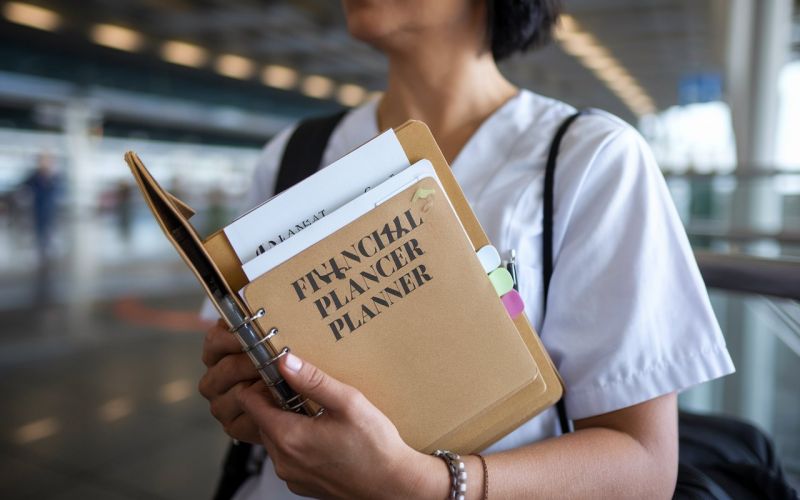The Importance of Emergency Funds: Protecting Your Income as an Overseas Worker
iSavta | 08.11.2024

For migrant caregivers in Israel, the journey to build a better life involves many sacrifices, including leaving loved ones behind and working in a new country to support them. While these sacrifices can be rewarding, they also come with financial risks, especially when unexpected situations arise. This is why an emergency fund—money set aside for unexpected expenses—is essential. An emergency fund acts as a financial cushion that provides peace of mind and protects you from financial stress when faced with a crisis. In this article, we’ll discuss why emergency funds are crucial for overseas workers and provide practical tips to help you start building one.
Why Emergency Funds Matter for Migrant Workers
As a caregiver working abroad, you may encounter emergencies that require immediate funds. These could include unexpected medical expenses, emergency travel back home, or situations where you suddenly lose your job or face income cuts. In these cases, an emergency fund can help cover costs without taking on debt or relying on loans, which often come with high-interest rates and can be challenging to repay.
An emergency fund serves several key purposes:
-
Job Security Is Not Guaranteed
Many migrant caregivers work on contracts that can be uncertain. If your employer decides to end your contract early or if your work situation changes suddenly, you could lose your source of income. With an emergency fund, you’ll have the money to cover basic needs like rent, food, and transportation while you look for new work or arrange for other income sources. -
Family Emergencies Back Home
Overseas workers often have strong family responsibilities. Family members may depend on your income for basic living expenses, healthcare, or education. If a loved one faces a medical emergency or another crisis back home, having an emergency fund allows you to help without sacrificing your own stability. -
Protection Against Health Crises
Working as a caregiver can be physically demanding, and if you fall ill or get injured, you may need time off to recover. In such cases, an emergency fund can cover daily expenses if you miss work. Additionally, if you need medical treatment not covered by insurance, having savings ensures you can access care without delay. -
Financial Peace of Mind
Having an emergency fund helps reduce stress. Knowing that you have money set aside for unexpected situations allows you to focus on your work and personal goals with confidence. Without financial stress weighing on you, you can make better decisions and be more effective in both your professional and personal life.
Steps to Build an Emergency Fund
Building an emergency fund doesn’t require a large amount of money right away; small, consistent savings will grow over time. Here’s how you can start building one step-by-step:
-
Set a Savings Goal
A typical emergency fund should cover three to six months of basic living expenses. This may include rent, food, transportation, and other essential needs. For a start, try aiming for at least one month’s worth of expenses and gradually increase this amount as your financial situation allows. -
Automate Savings
If you receive payments through a bank, consider setting up an automatic transfer of a small percentage into a separate savings account every month. Automating your savings ensures you are consistently putting money aside, making it easier to reach your goal over time without needing to remind yourself each month. -
Cut Non-Essential Expenses
Take a look at your monthly expenses and identify areas where you can reduce spending. Perhaps you can cook more meals at home rather than eating out or limit purchases that are not necessary. Small adjustments can free up money that you can redirect toward your emergency fund. -
Take Advantage of Extra Income Opportunities
If you can take on extra work, such as working overtime or completing small tasks on the side, put some or all of the additional income toward your emergency fund. The faster you can build your emergency savings, the more secure you’ll be in the face of an unexpected event. -
Use Your Fund Only for True Emergencies
An emergency fund should be used only for real emergencies, like sudden job loss, urgent medical expenses, or family crises. Avoid using this money for routine expenses or purchases. Remember, the goal is to keep this fund available for unexpected events that you cannot plan for in advance.
The Benefits of Maintaining an Emergency Fund
Once you’ve built up your emergency fund, make it a habit to maintain it. This fund can act as a financial safety net throughout your time abroad. Here are some long-term benefits:
-
Financial Independence: With an emergency fund, you are less reliant on borrowing money from friends, family, or high-interest lenders. This independence can relieve the stress of managing debt and paying back loans.
-
Security for Your Family: Knowing you have funds set aside provides reassurance not only for yourself but also for your family members who depend on you. They can feel more secure knowing you have a plan for handling financial challenges.
-
Ability to Focus on Long-Term Goals: Once you have an emergency fund, you can focus on other financial goals, like saving for your children’s education, buying a home, or preparing for retirement. An emergency fund is the foundation upon which you can build a stronger, more stable financial future.
Final Thoughts
Building an emergency fund may seem challenging at first, but the peace of mind and security it provides are invaluable. Starting with small, consistent contributions can make a big difference, protecting both you and your loved ones when life takes unexpected turns. As a migrant caregiver working in Israel, having an emergency fund can be the key to financial stability, ensuring you’re prepared to handle any challenge that comes your way. Take the first step today—your future self will thank you.
Read more about Money & Investments

Money & Investments











